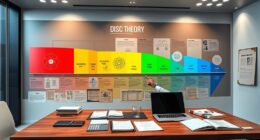Asking the right questions in a job interview shows your genuine interest and highlights your fit for the role. Consider asking about a typical day in the position to grasp daily tasks and expectations. Inquire about initial milestones to understand how to succeed early on. Dig into company culture and values to see if you align with them. Additionally, ask about growth opportunities and team dynamics. These questions not only reflect your enthusiasm but also help you gauge if the company is right for you. Stick around for more queries that can elevate your interview game!
Key Takeaways
- Inquire about daily responsibilities to assess the balance of teamwork and independent work in the role.
- Ask about initial milestones for new hires to understand performance expectations during the onboarding process.
- Request clarification on the company culture and values to gauge alignment with your personal beliefs and work style.
- Explore growth and development opportunities to ensure the role supports your long-term career advancement goals.
- Discuss current team challenges and conflict resolution strategies to understand team dynamics and adaptability.
Typical Day in the Role

When you're preparing for a job interview, it's smart to ask about a typical day in the role. This question can really illuminate what your daily responsibilities and task management might be like. By understanding what a typical day looks like, you can gauge how well you'd fit into the job description and the company culture.
You'll want to dig into the balance between independent work and team work. Ask about how often you'd collaborate with others and what those interactions might look like. This insight can help you assess team dynamics and communication styles, which are essential for a harmonious work environment.
Don't hesitate to inquire about specific projects or initiatives that might occupy your time. This will clarify the volume of tasks you can expect and provide a better sense of whether your skills align with the role. Additionally, uncovering expectations for time management and priorities will aid you in evaluating your potential success and satisfaction in the position. Overall, understanding the typical day can be a key factor in deciding if this job is right for you.
Key Traits for Success

To succeed in your next role, you'll want to focus on essential skills like adaptability and strong communication. A growth mindset is just as important, as it not only keeps you open to new opportunities but also shows employers you're keen to learn. Understanding these key traits can set you apart in the job market and enhance your career trajectory. Additionally, embracing the Law of Attraction can help you align your thoughts and beliefs with your career goals, further boosting your success.
Essential Skills Required
The essential skills required for success in any job role play a pivotal role in determining your effectiveness and career progression. One critical skill is effective communication. Being able to convey ideas clearly and listen actively fosters better teamwork and enhances project execution. Alongside communication, adaptability is key. In today's fast-paced work environment, you must adjust to changing circumstances and learn new methods quickly.
Organizational skills are another crucial trait. These skills allow you to prioritize tasks, manage your time efficiently, and meet deadlines without feeling overwhelmed. A well-organized approach to your work can greatly boost productivity and morale.
Moreover, cultivating a growth mindset is essential. Embracing challenges and viewing failures as learning opportunities enables you to stay relevant in your field. This mindset encourages continuous learning, ensuring you adapt to industry trends and evolving job demands. Additionally, fostering a positive mindset can significantly impact your resilience and overall performance in the workplace.
Growth Mindset Importance
Embracing a growth mindset is essential for achieving success in today's ever-changing work landscape. This mindset fosters resilience and adaptability, allowing you to tackle challenges and learn from failures. Research shows that individuals with a growth mindset are 34% more likely to reach their career goals, as they view effort and persistence as crucial. Organizations that promote a growth mindset culture experience 47% higher employee engagement, empowering you to develop your skills and contribute meaningfully to company goals. Leaders with a growth mindset also enhance team collaboration and innovation by encouraging open communication and diverse ideas.
Here's a quick look at how a growth mindset can impact your career development:
| Key Traits | Benefits | Impact on Company Culture |
|---|---|---|
| Resilience | Overcoming challenges | Higher employee engagement |
| Adaptability | Embracing change | Fosters innovation |
| Collaboration | Teamwork and shared goals | Strengthened communication |
| Continuous Learning | Lifelong skill development | Increased productivity |
In addition, prioritizing hydration and nutrition can significantly enhance your cognitive function and overall performance in the workplace.
Initial Milestones for New Hires

Setting clear initial milestones for new hires is essential for their success and integration into the team. To kick things off, ask about specific expectations for the first 30, 60, and 90 days. Understanding what contributions are anticipated helps you align your efforts with team goals.
It's also critical to inquire about key milestones or objectives that you should aim to achieve during these periods. These markers will help gauge your performance and guarantee you're on track. Don't forget to explore the structure of the onboarding process. Knowing about any training programs can greatly ease your shift into the role.
Additionally, ask about the support and resources available to help you meet these initial milestones. Understanding what's at your disposal can empower you to overcome challenges more effectively. Finally, request information on feedback mechanisms. Knowing how and when you'll receive feedback during those significant early stages allows you to adjust your approach and meet expectations confidently. By clarifying these elements, you'll set yourself up for a successful start in your new position.
Performance Review Process

Understanding how your performance will be evaluated is key to thriving in your new role. The performance review process typically happens bi-annually, providing structured feedback that helps you gauge your progress toward goals. During these reviews, you'll likely engage in informal one-on-one sessions with your manager, discussing your ongoing performance and identifying areas that need improvement.
To succeed, you'll want to familiarize yourself with the clear criteria set for measuring success. These benchmarks clarify expectations and help you understand what it means to be a high-performing individual in your role. As a new hire, you may also have specific milestones to meet within your first 30, 60, and 90 days. These milestones guide your initial performance and guarantee you're aligned with the company's objectives. Additionally, understanding the performance review process in different states can provide insight into how various organizations measure success and implement feedback.
Team Dynamics and Collaboration

Strong team dynamics are essential for a successful workplace, so it's important to explore how a team operates during your interview. Understanding the team's structure and how roles interact can give you insight into collaboration levels. You might consider asking about conflict resolution methods, as these reveal cohesion and adaptability.
Here's a quick reference table to guide your questions:
| Question Focus | Purpose |
|---|---|
| Team Structure | Gauge collaboration levels |
| Conflict Resolution | Assess team cohesion and adaptability |
| Communication Methods | Determine effectiveness of information flow |
| Recognition and Celebrations | Understand work culture and motivation |
Additionally, inquiring about team celebrations and recognition of successes can show how appreciation is woven into the work culture. Discussing opportunities for collaboration with other departments can also provide insight into the organization's teamwork philosophy and interdepartmental relationships. By focusing on these aspects, you can better gauge whether the team dynamics align with your values and work style, ensuring a more harmonious work environment for you.
Current Team Challenges

When you're in a job interview, asking about recent team obstacles can help you understand the current pressures the team faces. It's also important to learn how they resolve conflicts and where they might need additional support, as this shows how you could contribute right away. Understanding these aspects will give you a clearer picture of the team's resilience and collaborative spirit. Additionally, recognizing how the team manages emotional impact during challenging times can help you gauge the overall workplace environment.
Recent Team Obstacles
In today's fast-paced work environment, knowing a team's recent obstacles can give you valuable insight into its dynamics and challenges. By asking about these recent team challenges, you can identify specific areas where your skills may be beneficial. Inquire about the obstacles faced and how the team adapted, as this will reveal their level of resilience and adaptability.
Understanding these challenges also sheds light on the support and resources available for overcoming difficulties, which is essential for fostering a collaborative working environment. When teams encounter problems, the strategies they employ to navigate these hurdles can inform you about the organization's culture and expectations surrounding problem-solving. Additionally, effective teams often utilize data-driven marketing strategies to enhance their approach to overcoming obstacles, showcasing their commitment to continuous improvement.
Moreover, discussing areas where the team may need additional support highlights the potential for you to make a meaningful impact from the outset. This not only demonstrates your interest in contributing effectively but also shows that you're keen on understanding how you can fit into the existing framework. Remember, gaining insight into recent team obstacles equips you with the knowledge to assess whether this is the right workplace for you and how you can thrive within it.
Conflict Resolution Strategies
Understanding how a team handles conflict can be just as important as learning about their recent obstacles. To gauge their conflict resolution strategies, ask how the team approaches disputes. Are there specific frameworks or methodologies they utilize? This insight will reveal the team's commitment to effective communication and collaboration.
Request examples of past conflicts and how they were resolved. This not only showcases the team's resilience but also highlights their adaptability. Understanding how team members interact during conflicts can illuminate the overall team culture. Are they open and supportive, or do they struggle to communicate?
It's also valuable to assess how frequently conflicts arise. Frequent disputes might indicate underlying issues, while a low frequency could suggest strong collaboration. Inquire about the mechanisms in place for ongoing feedback. This can foster a supportive environment for conflict resolution, ensuring that team members feel comfortable addressing issues before they escalate. Additionally, exploring how the team incorporates emotional well-being through practices like pet therapy could enhance their conflict resolution approach.
Support Needed Areas
Diving into recent challenges faced by the team can uncover areas where they might need extra support or resources. By addressing these topics, you show your potential employer that you're serious about contributing positively from day one. Here are four key areas to explore:
- Current Struggles: Ask about specific challenges the team is facing. This illustrates your proactive approach to problem-solving.
- Conflict Management: Inquire how the team resolves conflicts. Understanding their strategies can help you gauge the dynamics and adaptability within the team.
- Support Systems: Learning about the support structures in place can reveal how the team collaborates during tough times.
- Adaptability: Discover how the team has responded to change. This insight will help you understand the resilience expected from new hires. Additionally, being aware of financial health can enhance your ability to contribute to the team's overall success.
Description of Company Culture

A company's culture plays an essential role in shaping your experience as an employee. It embodies the organization's values, beliefs, and behaviors that create the work environment you'll thrive in. Understanding the company culture helps you evaluate if you'll fit in and feel satisfied at your workplace.
Research shows that 88% of job seekers prioritize company culture when applying for jobs, with many willing to accept a lower salary for a more fulfilling environment. A strong culture often correlates with lower turnover rates—only 13.9%—while a weak culture can lead to high turnover, reaching 48.4%. This highlights the importance of aligning your values with the company's values.
Moreover, companies with engaged employees see a 12% increase in productivity, while unhappy employees contribute to a 10% decline. Consequently, analyzing the company culture during your interview can clarify if it's the right fit for you. Asking about team dynamics, communication styles, and how the organization supports employee growth can provide valuable insights. A clear understanding of the culture can enhance your job satisfaction and guarantee you're making the best decision for your career.
Core Company Values

Core company values serve as the backbone of an organization, guiding its mission and shaping employee behaviors. Understanding these values is essential for evaluating your compatibility with the company's culture, which directly impacts your job satisfaction and overall performance. When you're aligned with core company values, you're more likely to thrive in your role.
Consider asking the following questions during your interview to gauge the importance of core values within the organization:
- What are the company's core values, and how are they integrated into daily operations?
- Can you share an example of how these values influenced a recent decision?
- How does the company support employees in embodying these values?
- What measures are in place to guarantee alignment between team members and core values?
Remote Work Policies

When considering a job, it's crucial to understand the company's remote work policies, as they can greatly impact your work-life balance and overall job satisfaction. In today's work environment, flexible remote work options are a game changer. Research shows that 70% of employees report increased job satisfaction when given the chance to work remotely.
You'll want to ask about the specific policies in place. Do they offer a hybrid model, allowing for both in-office and remote work? A staggering 83% of employees prefer this flexibility, which can enhance company culture and foster a supportive atmosphere.
Effective remote work policies not only boost productivity—by as much as 25%—but also promote employee well-being. Companies that prioritize these policies often see a 10% decrease in turnover, indicating that a balanced approach is beneficial for everyone involved.
Finally, inquire about the communication tools and guidelines they have for remote work. With 74% of remote employees facing challenges in this area, clear expectations are crucial for maintaining productivity. Understanding these aspects will help guarantee that you're aligning with a company that values your work-life balance and overall happiness. Additionally, companies utilizing AI-driven personalization in their remote work strategies often experience enhanced employee engagement and satisfaction.
Next Steps in Hiring Process

When you're in a job interview, it's essential to ask about the hiring timeline to manage your expectations. Clarifying how and when you'll receive updates can give you a clearer picture of the process ahead. This not only shows your interest but also helps you align your job search with their timeline.
Hiring Timeline Clarification
Understanding the hiring timeline is essential for candidates maneuvering the job search process. By clarifying this timeline, you gain insight into when to expect feedback and the next steps in the interview process, helping you manage your expectations effectively.
Consider asking the following questions to gain clarity:
1. What does the overall hiring timeline look like?
This helps you understand the duration of each stage.
2. Are there any additional requirements, like background checks or references?
Knowing this can affect how quickly things move forward.
3. How many candidates are you considering, and when will the next interviews take place?
This gives context to your position in the process.
4. What methods and frequency of communication can I expect post-interview?
This eases anxiety and fosters a professional relationship with the hiring team.
A clear hiring timeline reflects the organization's professionalism and commitment to keeping candidates informed throughout their journey. By understanding these elements, you're better equipped to navigate the hiring timeline and set realistic candidate expectations.
Communication Post-Interview
After an interview, knowing what to expect regarding communication can greatly ease your nerves. Clarifying the timeline for the hiring decision helps manage your expectations and reduces anxiety. Ask your interviewer how long it typically takes to make a decision; companies often follow up within a week. This timeframe can vary, but having a clear idea allows you to plan accordingly.
Understanding the communication methods used post-interview—whether through email or phone calls—provides insight into the company's professionalism and organizational structure. It's also wise to inquire if background checks or references are required, so you're prepared for any additional steps in the hiring process.
Timeline for Hiring Decision

Clarifying the timeline for the hiring decision is essential for your job search. Knowing when you can expect feedback and the next steps in the hiring process can greatly reduce anxiety and help you plan accordingly. Here are some key aspects to take into account:
- Interview Duration: Ask how long they expect the interview process to take.
- Decision Timeline: Inquire when the team anticipates making a decision. This gives you insight into their urgency and helps align with your own job search timeline.
- Milestones: Confirm if there are specific deadlines or milestones that are driving the hiring process. This can clarify the company's priorities.
- Communication Process: Understand who will reach out to you post-interview and how communication will be handled. This knowledge can ease worries during the waiting period.
Opportunities for Growth and Development

Once you have a clearer picture of the hiring timeline, it's important to explore the opportunities for growth and development within the organization. This is your chance to ask questions that reveal how the company supports professional development. Inquire about training programs and mentorship opportunities; they show your commitment to long-term career growth.
Ask about career advancement pathways—understanding how the company fosters employee growth can greatly impact your decision. Companies that prioritize these aspects often enjoy higher retention rates and employee engagement.
Also, find out about the frequency and structure of performance reviews. This insight reveals how the organization evaluates and supports employee progress. You might also want to ask about potential role expansion or new projects. This not only demonstrates your ambition but also aligns you with the company's future goals and innovation strategies.
Ultimately, by asking about these areas, you position yourself as a candidate who values continuous improvement and lifelong learning—qualities that many organizations seek in their employees. This proactive approach can help you gauge if the company is the right fit for your career aspirations.
Frequently Asked Questions
What Is an Intelligent Question to Ask an Interviewer?
An intelligent question to ask an interviewer could focus on the company's values and culture. You might say, "Can you describe the team dynamics and the company's core values?" This shows you're genuinely interested in how you'll fit in. Additionally, asking about growth opportunities, like "What does career development look like here?" reflects your long-term commitment. These questions not only demonstrate your engagement but also help you assess if the role aligns with your goals.
What Are the 5 Star Interview Questions?
Imagine you're sitting in a medieval castle, preparing for a knight's tournament. Just like that, you need to arm yourself with the right questions for your interview. Five-star interview questions focus on company culture, values, growth opportunities, team dynamics, and management style. Asking about the company's core values or how the team celebrates successes can reveal if you're a perfect fit. Don't forget to inquire about training programs to show your commitment to growth!
What Are the Top 5 Questions to Ask an Interviewer About the Company?
When you're interviewing, asking about the company's core values is essential; it helps you see if they align with your beliefs. You should also inquire about diversity and inclusion initiatives to understand their commitment to a supportive environment. Questions about growth plans reveal their strategic direction, while asking about team dynamics can gauge cultural fit. Finally, learning about management styles and feedback processes shows how they'll support your professional growth.
What Are the Top 10 Questions to Ask an Interviewer Internally?
So, you think you know everything about the job? Think again! When you're interviewing, ask about daily responsibilities and the team's collaboration style. It'll show you're enthusiastic and not just another candidate. Don't forget to inquire about work-life balance and growth opportunities—these reveal if the company's values align with yours. Plus, asking about future goals helps you gauge if you'll fit into their vision. Curious minds make the best hires!
Conclusion
To sum up, asking thoughtful questions not only shows your interest but also reveals your commitment to finding the right fit. By inquiring about the typical day, key traits for success, and opportunities for growth, you demonstrate your enthusiasm to contribute and thrive. So, embrace the conversation, explore the team dynamics, and clarify the next steps. Remember, a job interview is a two-way street, where your questions can pave the way to a fulfilling career.
Felicity, our Author, pens in-depth articles and guides that delve into the heart of personal discovery. Her narrative-driven approach weaves together theory, practice, and personal anecdotes, making the journey of self-exploration both relatable and inspiring. Felicity’s contributions help illuminate the path for those seeking a deeper understanding of themselves and their relationships.










